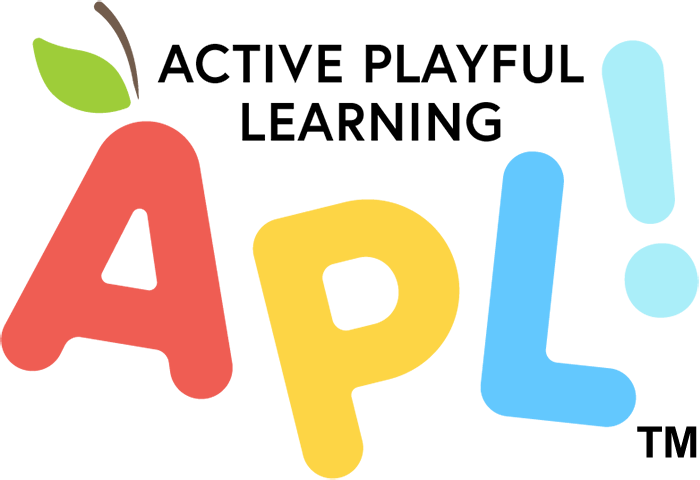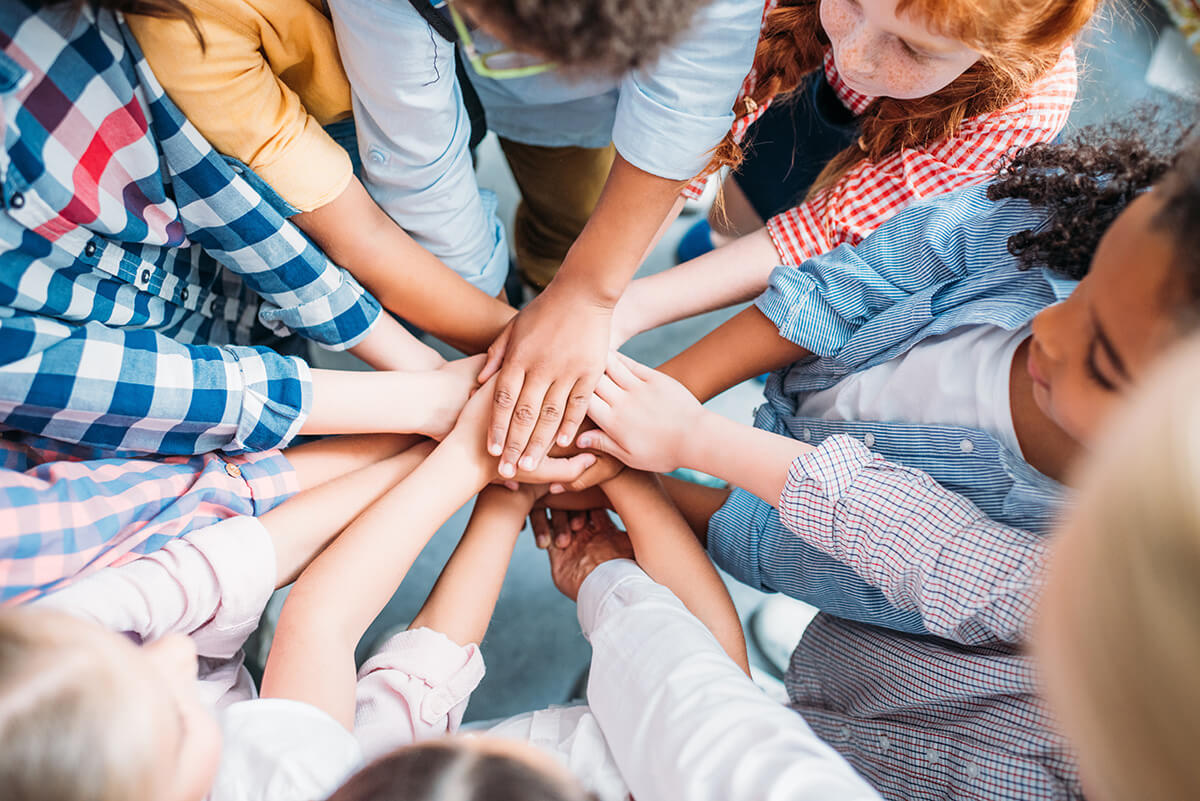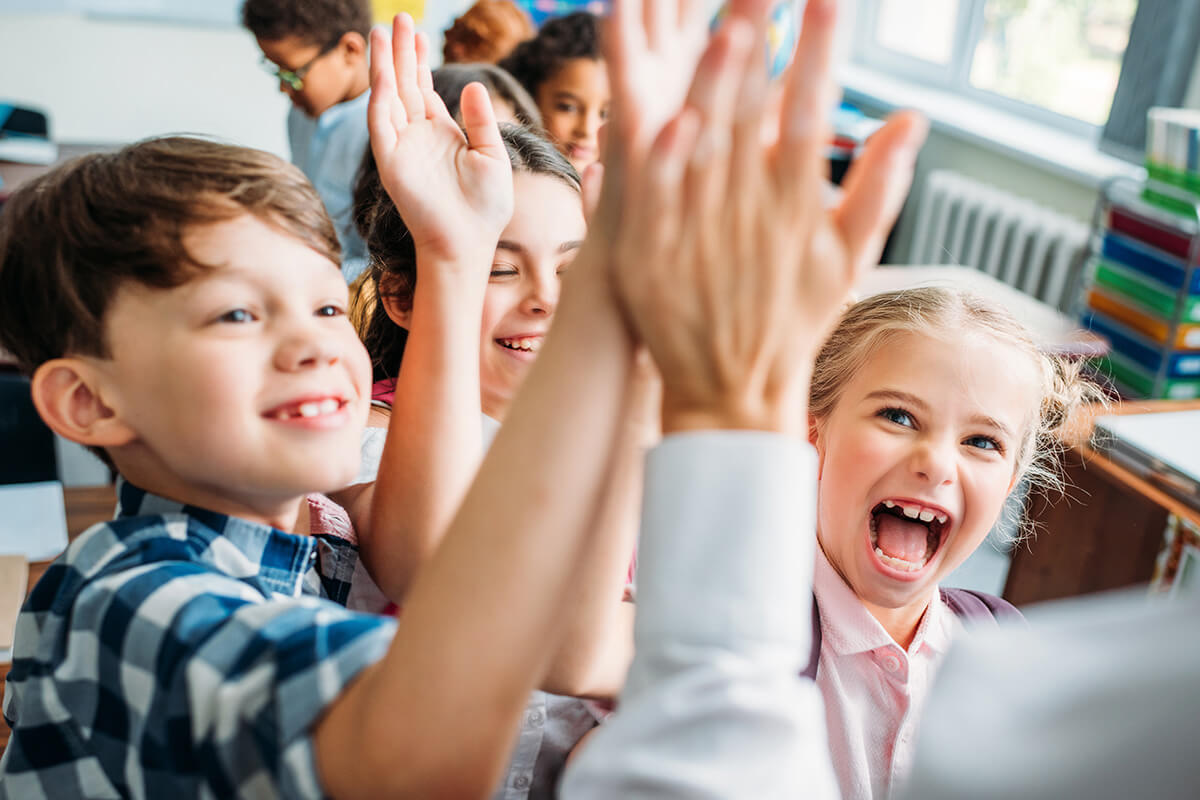The Science of Playful Learning

Research from the interdisciplinary science of learning led our research team to develop their Active Playful Learning (APL) educational framework. APL instruction rests on a foundation of acknowledging students’ backgrounds and designing lessons that build on the skills and knowledge that they bring into the classroom. The next part of APL focuses on how learning occurs. Research tells us that children learn best when they are actively engaged in learning that is meaningful, socially interactive, iterative, and joyful. These principles coalesce in active playful learning, especially guided play. The third and final part of APL establishes a link between playful learning and outcomes in mathematics, spatial learning, language, vocabulary, and literacy.
This active playful pedagogy enhances learning through intentional instruction that activates students’ autonomy and intrinsic motivation while teacher guide them toward a learning goal.
By providing a child agency while learning, playful learning also supports growth in a suite of complementary core competencies that the child will need to successfully compete as an adult – summarized as the 6 C’s – Collaboration, Communication, Content, Critical Thinking, Creative Innovation and Confidence. (Adapted from Nesbitt, et al. 2023)
The references that follow provide the foundation supporting the efficacy of this approach.
References
Alfieri, L., Brooks, P., Aldrich, N., & Tenenbaum, H. (2011). Does discovery-based instruction enhance learning? Journal of Educational Psychology, 103(1), 1–18. https://doi.org/10.1037/ a0021017
Bailey, D. H., Duncan, G. J., Cunha, F., Foorman, B. R., & Yeager, D. S. (2020). Persistence and fade-out of educational-intervention effects: Mechanisms and potential solutions. Psychological Science in the Public Interest, 21(2), 55–97. https://doi.org/10.1177/1529100620915848
Bisson, C., & Luckner, J. L. (1996). Fun in learning: The pedagogical role of fun in adventure education. Journal of Experiential Education, 19(2), 108–112. https://doi.org/10.1177/105382599601900208
Blair, C. (2002). School readiness: Integrating cognition and emotion in a neurobiological conceptualization of children’s functioning at school entry. American Psychologist, 57(2), 111–127. https://psycnet.apa.org/doiLanding?doi=10.1037%2F0003-066X.57.2.111
Bransford, J., Brown, A., & Cocking, R. (Eds.). (2000). How people learn: Brain, mind, experience, and school (Expanded ed.). National Academies Press.
Cantor, P., Osher, D., Berg, J., Steyer, L., & Rose, T. (2019). Malleability, plasticity, and individuality: How children learn and develop in context. Applied Developmental Science, 23(4), 307–337. https://doi.org/10.1080/10888691.2017.1398649
Christopher, C., & Farran, D. (2020). Academic gains in kindergarten related to eight classroom practices. Early Childhood Research Quarterly, 53(4), 638–649. https://doi.org/10.1016/j.ecresq.2020.07.001
Claro, S., Paunesku, D., & Dweck, C. S. (2016). Growth mindset tempers the effects of poverty on academic achievement. Proceedings of the National Academy of Sciences of the United States of America, 113(31), 8664–8668. https://doi.org/10.1073/pnas.1608207113
Cunningham, A. E., & Stanovich, K. E. (1997). Early reading acquisition and its relation to reading experience and ability 10 years later. Developmental Psychology, 33(6), 934–945. https://doi.org/10.1037/0012-1649.33.6.934
Darling-Hammond, L., Schachner, A., Edgerton, A. K., Badrinarayan, A., Cardichon, J., Cookson, P. W., Jr., Griffith, M., Kievan, S., Maier, A., Martinez, M., Melnick, H., Truong, N., & Wojcikiewicz, S. (2020). Restarting and reinventing school: Learning in the time of COVID and beyond. Learning Policy Institute. http://learningpolicyinstitute.org/product/restarting-reinventing-school-covid
Darling-Hammond, L., Flook, L., Cook-Harvey, C., Barron, B., & Osher, D. (2020). Implications for educational practice of the science of learning and development. Applied Developmental Science, 24 (2), 97–140. https://doi.org/10.1080/10888691.2018.1537791
DeCaro, M. S., & Rittle-Johnson, B. (2012). Exploring mathematics problems prepares children to learn from instruction. Journal of Experimental Child Psychology, 113(4), 552–568. https://doi.org/10.1016/j.jecp.2012.06.009
Dickinson, D. K., & Porche, M. V. (2011). Relation between language experiences in preschool classrooms and children’s kindergarten and fourth-grade language and reading abilities. Child Development, 82(3), 870–886. https://doi.org/10.1111/j.1467-8624.2011.01576.x
Duckworth, A. L., Peterson, C., Matthews, M. D., & Kelly, D. R. (2007). Grit: Perseverance and passion for long-term goals. Journal of Personality and Social Psychology, 92(6), 1087–1101. https://doi.org/10.1037/0022-3514.92.6.1087
Fisher, K., Hirsh-Pasek, K., Golinkoff, R. M., Singer, D. G., & Berk, L. (2010). Playing around in school: Implications for learning and educational policy. In A. Pellegrini (Ed.), The Oxford handbook of the development of play (pp. 341–363). Oxford University Press. Fisher, K. R., Hirsh‐Pasek, K., Newcombe, N., & Golinkoff, R. M. (2013). Taking shape: Supporting preschoolers’ acquisition of geometric knowledge through guided play. Child Development, 84(6), 1872–1878. https://doi.org/10.1111/cdev.12091
Fredrickson, B. (2013). Updated thinking on positivity ratios. American Psychologist, 68(9), 814–822. https://doi.org/10.1037/a0033584
Gay, G. (2000). Culturally responsive teaching: Theory, research, and practice. Teachers College Press. Ginsburg, K. R., & Committee on Psychosocial Aspects of Child and Family Health. (2007). The importance of play in promoting healthy child development and maintaining strong parent-child bonds. Pediatrics, 119(1), 182–191. https://doi.org/10.1542/peds.2006-2697
Golinkoff, R. M. (1981). The case for semantic relations: Evidence from the verbal and nonverbal domains. Journal of Child Language, 78(2), 413–438. https://doi.org/10.1017/S0305000900003275
Golinkoff, R. M., & Hirsh-Pasek, K. (2016). Becoming brilliant: What science tells us about raising successful children. American Psychological Association. Gopnik, A., & Wellman, H. M. (2012). Reconstructing constructivism: Causal models, Bayesian learning mechanisms and the theory theory. Psychological Bulletin, 138(6), 1085–1108. https://doi.org/10.1037/2Fa0028044
Hadley, E. B., Dickinson, D. K., Hirsh‐Pasek, K., Golinkoff, R. M., & Nesbitt, K. T. (2016). Examining the acquisition of vocabulary knowledge depth among preschool students. Reading Research Quarterly, 51(2), 181–198. https://doi.org/10.1002/rrq.130
Haimovitz, K., & Dweck, C. S. (2017). The origins of children’s growth and fixed mindsets: New research and a new proposal. Child Development, 88(6), 1849–1859. https://doi.org/10.1111/cdev.12955
Han, M., Moore, N., Vukelich, C., & Buell, M. (2010). Does play make a difference? Effects of play intervention on at-risk preschoolers’ vocabulary learning. American Journal of Play, 3(1), 82–105. https://files.eric.ed.gov/fulltext/EJ1070222.pdf
Harbour, K. E., Evanovich, L. L., Sweigart, C. A., & Hughes, L. E. (2015). A brief review of effective teaching practices that maximize student engagement. Preventing School Failure: Alternative Education for Children and Youth, 59(1), 5–13. https://doi.org/10.1080/1045988X.2014.919136
Hargrave, A. C., & Sénéchal, M. (2000). A book reading intervention with preschool children who have limited vocabularies: The benefits of regular reading and dialogic reading. Early Childhood Research Quarterly, 15(1), 75–90. https://doi.org/10.1016/S0885-2006(99)
Hertz-Lazarowitz, R., Kagan, S., Sharan, S., Slavin, R., & Webb, C. (Eds.). (2013). Learning to cooperate, cooperating to learn. Springer Science & Business Media. Hirsh-Pasek, K., Adamson, L. B., Bakeman, R., Owen, M. T., Golinkoff, R. M., Pace, A., Yust, P. K. S., & Suma, K. (2015). The contribution of early communication quality to low-income children’s language success. Psychological Science, 26(7), 1071–1083. https://doi.org/10.1177/0956797615581493
Hirsh-Pasek, K., Zosh, J. M., Golinkoff, R. M., Gray, J. H., Robb, M. B., & Kaufman, J. (2015). Putting education in “educational” apps: Lessons from the science of learning. Psychological Science in the Public Interest, 16(1), 3–34. https://doi.org/10.1177/
Hirsh-Pasek, K., Hadani, H., Blinkoff, E., & Golinkoff, R. M. (2020). A new path to education reform: Playful learning promotes 21st century skills in school and beyond. The Brookings Institution. https://www.brookings.edu/policy2020/bigideas/a-new-path-to-education-reform-playfullearning-promotes-21st-century-skills-in-schools-and-beyond/
Hirsh-Pasek, K., Masters, A. S., Christie, S., Gibbs, H. M., Evans, N. S., Fletcher, K. K., Pesch, A., Yang, H., Fan, W., Todaro, R. D., Golinkoff, R. M., & Xu, F. (2022). Where global science meets playful learning: Implications for home, school, and city planning [White paper]. The Lego Foundation and the Yidan Foundation. https://learningthroughplay.com/explore-the-research/where-global-science-meets-playful-learning-implications-for-home-school-cities-and-digitalspaces
Hogg, L. (2011). Funds of Knowledge: An investigation of coherence within the literature. Teaching and Teacher Education, 27(3), 666–677. https://doi.org/10.1016/j.tate.2010.11.005
Jirout, J. J. (2020). Supporting early scientific thinking through curiosity. Frontiers in Psychology, 11. https://doi.org/10.3389/fpsyg.2020.01717
Jirout, J. J., Ruzek, E., Vitiello, V. E., Whittaker, J., & Pianta, R. C. (2023). The association between and development of school enjoyment and general knowledge. Child Development, 94(2), e119-e127. https://doi.org/10.
Ladson-Billings, G. (2021). Culturally relevant pedagogy: Asking a different question. Teachers College Press.
Leyva, D., Weiland, C., Shapiro, A., Yeomans-Maldonado, G., & Febles, A. (2022). A strengths-based, culturally responsive family intervention improves Latino kindergarteners’ vocabulary and approaches to learning. Child Development, 93(2), 451–467. https://doi.org/10.1111/cdev.13698
Masek, L., Weiss, S., McMillan, B., Paterson, S., Golinkoff, R. M., & Hirsh-Pasek, K. (2022). Contingent conversations build more than language. How communication interactions in toddlerhood relate to preschool executive function skills. Developmental Science, 26(3). https://doi.org/10.1111/desc.13338
Masek, L. R., Paterson, S. J., Golinkoff, R. M., Bakeman, R., Adamson, L. B., Owen, M. T., Pace, A., & Hirsh-Pasek, K. (2020). Beyond talk: Contributions of quantity and quality of communication to language success across socioeconomic strata. Infancy, 26(1), 123–147. https://doi.org/10.1111/infa.12378
McCormick, M., Weiland, C., Hsueh, J., Pralica, M., Weissman, A. K., Moffett, L., Snow, C., & Sachs, J. (2021). Is skill type the key to the preK fadeout puzzle? Differential associations between enrollment in preK and constrained and unconstrained skills across kindergarten. Child Development, 92(4), e599–e620. https://doi.org/10.1111/cdev.13520
Meltzoff, A. N., Kuhl, P. K., Movellan, J., & Sejnowski, T. J. (2009). Foundations for a new science of learning. Science, 325(5938), 284–288. https://doi.org/10.1126/science.1175626
Metcalfe, J., & Kornell, N. (2007). Principles of cognitive science in education: The effects of generation, errors, and feedback. Psychonomic Bulletin & Review, 14(2), 225–229. https://doi.org/10.3758/bf03194056
Moll, L. C., Amanti, C., Neff, D., & Gonzalez, N. (1992). Funds of knowledge for teaching: Using a qualitative approach to connect homes and classrooms. Theory Into Practice, 31(2), 132–141. https://doi.org/10.1080/00405849209543534
Montroy, J. J., Bowles, R. P., Skibbe, L. E., & Foster, T. D. (2014). Social skills and problem behaviors as mediators of the relationship between behavioral self-regulation and academic achievement. Early Childhood Research Quarterly, 29(3), 298–309. https://doi.org/10.1016/j.ecresq.2014.03.002
Nasir, N. S., Lee, C. D., Pea, R., & McKinney de Royston, M. (2021). Rethinking learning: What the interdisciplinary science tells us. Educational Researcher, 50(8), 557-565. https://doi.org/10.
Nesbitt, K. T., Farran, D. C., & Fuhs, M. W. (2015). Executive function skills and academic achievement gains in prekindergarten: Contributions of learning-related behaviors. Developmental Psychology, 51(7), 865–878. https://doi.org/10.1037/dev0000021
Nesbitt, K. T., Blinkoff, E., Golinkoff, R. M., & Hirsh-Pasek, K. (2023). Making schools work: An equation for active playful learning. Theory Into Practice, 62(2), 141-154. https://doi.org/10.
O’Connor, E. (2010). Teacher–child relationships as dynamic systems. Journal of School Psychology, 48(3), 187–218. http://doi.org/10.1016/j.jsp.2010.01.001
Pan, S. C., Sana, F., Samani, J., Cooke, J., & Kim, J. A. (2020). Learning from errors: Students’ and instructors’ practices, attitudes, and beliefs. Memory, 28(9), 1105–1122. https://doi.org/10.1080/09658211.2020.1815790
Pellegrino, J. W., & Hilton, M. L. (Eds.). (2012). Education for life and work: Developing transferable knowledge and skills in the 21st century. National Academies Press. Pianta, R., Belsky, J., Vandergrift, N., Houts, R., & Morrison, F. (2008). Classroom effects on children’s achievement trajectories in elementary school. American Educational Research Journal, 45(2), 365–397. http://doi.org/10.3102/0002831207308230
Portilla, X. A., Ballard, P. J., Adler, N. E., Boyce, W. T., & Obradović, J. (2014). An integrative view of school functioning: Transactions between self-regulation, school engagement, and teacher-child relationship quality. Child Development, 85(5), 1915–1931. https://doi.org/10.1111/cdev.12259
Pyle, A., & Danniels, E. (2016). A continuum of play-based learning: The role of the teacher in play-based pedagogy and the fear of hijacking play. Early Education and Development, 23(3), 274–289. https://doi.org/10.1080/10409289.2016.1220771
Ramani, G. B., Siegler, R. S., & Hitti, A. (2012). Taking it to the classroom: Number board games as a small group learning activity. Journal of Educational Psychology, 104(3), 661–672. http://doi.10.1037/a0028995.supp
Ribner, A. D., Barr, R. F., & Nichols, D. L. (2021). Background media use is negatively related to language and literacy skills: Indirect effects of self-regulation. Pediatric Research, 89(6), 1–8. https://doi.org/10.1038/s41390-020-1004-5
Robinson, K., & Mueller, A. S. (2014). Behavioral engagement in learning and math achievement over kindergarten: A contextual analysis. American Journal of Education, 120(3), 325–349. https://doi.org/10.1086/675530
Ruggeri, A. (2022). An introduction to ecological active learning. Current Directions in Psychological Science, 31(6), 471–479. https://doi.org/10.1177/09637214221112114
Schmidt, M. E., Pempek, T. A., Kirkorian, H. L., Lund, A. F., & Anderson, D. R. (2008). The effects of background television on the toy play behavior of very young children. Child Development, 79(4), 1137–1151. https://doi.org/10.1111/j.1467-8624.2008.01180.x
Schmitt, S. A., Korucu, I., Napoli, A. R., Bryant, L. M., & Purpura, D. J. (2018). Using block play to enhance preschool children’s mathematics and executive functioning: A randomized controlled trial. Early Childhood Research Quarterly, 44(3), 181–191. https://doi.org/10.1016/j.ecresq.2018.04.006
Skene, K., O’Farrelly, C. M., Byrne, E. M., Kirby, N., Stevens, E. C., & Ramchandani, P. G. (2022). Can guidance during play enhance children’s learning and development in educational contexts? A systematic review and meta‐analysis. Child Development, 93(4), 1162–1180. https://doi.org/10.1111/cdev.13730
Stricker, L. W., & Sobel, D. M. (2020). Children’s developing reflections on and understanding of creativity. Cognitive Development, 55, Article 100916. https://doi.org/10.1016/j.cogdev.2020.100916
Toub, T., Hassinger-Das, B., Nesbitt, K., Ilgaz, H., Weisberg, D., Hirsh-Pasek, K., Golinkoff, R. M., Nicolopoulou, A., & Dickinson, D. (2018). The language of play: Developing preschool vocabulary through play following shared book-reading. Early Childhood Research Quarterly, 45(4), 1–17. https://doi.org/10.1016/j.ecresq.2018.01.010
Weisberg, D., Hirsh-Pasek, K., Golinkoff, R., Kittredge, A., & Klahr, D. (2016). Guided play: Principles and practice. Current Directions in Psychological Science, 25(3), 177–182. https://doi.org/10.1177/0963721416645512
Whitehurst, G. J., Epstein, J. N., Angell, A. L., Payne, A. C., Crone, D. A., & Fischel, J. E. (1994). Outcomes of an emergent literacy intervention in Head Start. Journal of Educational Psychology, 86 (4), 542–555. https://doi.org/10.1037/0022-0663.86.4.542
Willingham, D. T. (2021). Why don’t students like school? A cognitive scientist answers questions about how the mind works and what it means for the classroom. John Wiley & Sons. Xu, F. (2019). Towards a rational constructivist theory of cognitive development. Psychological Review, 126(6), 841–864. https://doi.org/10.1037/rev0000153
Yannier, N., Hudson, S. E., Koedinger, K. R., Hirsh-Pasek, K., Golinkoff, R. M., Munakata, Y., Doeble, S., Schwartz, D. L., Deslauriers, L., McCarty, L., Callaghan, K., Theobald, E. J., Freeman, S., Cooper, K. M., & Brownell, S. E. (2021). Active learning: “Hands-on” meets “mindson.” Science, 374(6563), 26–30. https://doi.org/10.1126/science.abj9957
Yogman, M., Garner, A., Hutchinson, J., Hirsh-Pasek, K., Golinkoff, R. M., Baum, R., Gambon, T., Lavin, A., Mattson, G., Wissow, L., Hill, D. L., Ameenuddin, N., Chassiakos, Y. (. R., Cross, C., Boyd, R., Mendelson, R., Moreno, M. A., Radesky, J., Swanson, W. S., . . . Smith, J. (2018). The power of play: A pediatric role in enhancing development in young children. Pediatrics, 142(3), e20182058. https://doi.org/10.1542/peds.2018-2058
Young, A. G., Alibali, M. W., & Kalish, C. (2019). Causal learning from joint action: Collaboration helps first graders but hinders kindergarteners. Journal of Experimental Child Psychology, 177, 166–186. http://doi.org/10.1016/j.jecp.2018.08.001
Zosh, J. M., Gaudreau, C., Golinkoff, R. M., & Hirsh-Pasek, K. (2022). The power of playful learning in the early childhood setting. In S. Friedman, S. Bredekamp, M. Masterson, B. Willer, & B. L. Wright (Eds.), Developmentally appropriate practice in early childhood programs serving children from birth through age 8 (4th ed., pp. 83–107). NAEYC. Zosh, J. M., Hassinger-Das, B., & Laurie, M. (2022). Learning through play and the development of holistic skills across childhood. The LEGO Foundation. https://learningthroughplay.com/explorethe-research/the-relationship-between-learning-through-play-and-holistic-skills
Zosh, J. M., Hirsh-Pasek, K., Hopkins, E. J., Jensen, H., Liu, C., Neale, D., Solis, S. L., & Whitebread, D. (2018). Accessing the inaccessible: Redefining play as a spectrum. Frontiers in Psychology, 9, 1124. https://doi.org/10.3389/fpsyg.2018.01124
Additional Resources
1) Hirsh-Pasek, K., Golinkoff, R. M., Nesbitt, K., Lautenbach, C., Blinkoff, E., & Fifer, G. (2022). Making schools work: Bringing the science of learning to joyful classroom practice. Teachers College Press.
Making Schools Work: Bringing the Science of Learning to Joyful Classroom Practice was written by teachers, school administrators, and scientists to create a model for active, playful learning that would work in classrooms. Grounded in insights into how human brains learn, the book examines how to co-construct and reimagine an optimal educational system for all children that is culturally responsive, inclusive, effective, and fun.
2) The Brookings Institution Playful Learning Series website. https://www.brookings.edu/series/playful-learning/
The Brookings Institution Playful Learning series is a collection of resources (articles, posts, and discussions) on how learning through play can help give children the full breadth of skills to thrive in the 21st century. The collection provides information on how learning through play can harness the power of children’s imaginations and inspire active engagement and learning. Resources are updated to reflect the changing context of our education systems.
3) The LEGO Foundation Learning Through Play website. https://learningthroughplay.com/
The LEGO Foundation Learning Through Play website provides a wide array of resources for families, educators, administrators, and policymakers wanting to learn more about the value of playful learning and how to make playful learning a reality for all children. Resources include summaries of the latest research on learning through play and ideas for guided play activities that can be delivered in homes and schools.




